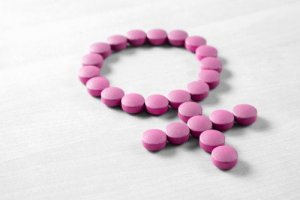Estrogen: An Essential Hormone for Women

Estrogen is one of the most important hormones that the female body produces. It is responsible for breast growth, menstruation, and the widening of the hips.
While both men and women produce estrogen naturally, to ensure the preservation of the species. However, women experience the effects of it during three fundamental stages: Puberty, pregnancy, and menopause.
In general, this hormone’s main responsibility is to ensure the proper functioning of the body for ovulation and fertilization. In the same way, it’s also used additionally in some replacement therapies, such as those associated with menopause or climacteric.
For this reason, we are going to go a little deeper into the subject.
Types of estrogen
There are three types of estrogen found in the body, which all fulfill endocrine functions. All three types act on the nucleus of the cells that regulate protein synthesis.
- Estrone acquires the aromatase enzyme through the synthesis of progesterone. Its production takes place in fatty tissue and the ovaries.
- Estradiol obtains the enzyme aromatase from testosterone and is obtained in abundance in the body during fertile years.
- Finally, there’s estriol. It’s synthesized through androsterone and occurs in huge amounts during pregnancy.
One of the keys to a healthy brain

Estrogen helps regulate many vital functions of the body, as suggested by this research conducted by a team from the Mayo Clinic. Another one of its functions is that it acts as an integral part of the “command center” of the human body.
Estrogen produces these benefits by promoting the continuous flow of both blood and glucose to the brain. This is fundamental for the health and proper functioning of neurons and certain neurotransmitters.
Other benefits
Those are not the only benefits that this hormone provides. Female sex hormones, in addition to regulating the correct functioning of the reproductive cycle and working together with androgens to stimulate the libido, also support the development of secondary sexual organs.
This hormone also helps reduce blood pressure and protect bones due to calcium assimilation. Additionally, it also positively affects the functioning of the urinary system.
Found out more: The Benefits of Estrogen in Your Diet
Menopause and estrogen hormones

When menopause happens, estrogen production abruptly reduces, which leads to major changes in the body.
Some common symptoms of menopause include vaginal dryness, radical variations in mood, extreme tiredness, excessive sweating, and osteoporosis. Also, the risks of suffering from cardiovascular diseases increase, according to this study by Dr. Arteaga.
There’s also evidence that menopause leads to a loss of collagen and calcium. That’s why, during this stage full of changes, women should visit the gynecologist to establish guidelines.
It’s also normal during this stage for women to notice mood swings that are more pronounced than usual. This is all part of the new life cycle she’s about to experience.
Discover: Tips to Keep Your Skin Looking Young at 40
What’s the relationship between estradiol and Alzheimer’s disease?
Estradiol is the strongest of the estrogen hormones. It plays a vital role in motor functions and is also related to memory and learning processes, as well as sensitivity to pain.
Some specialists even attribute to estradiol the ability to protect the brain against possible damage caused by diseases such as Alzheimer’s disease.
However, the evidence isn’t yet conclusive, so it’s too early to state this assumption outright.
The best way to preserve health, especially in the menopausal period, is a balanced diet (with special emphasis on foods with omega-3 and calcium), the practice of physical exercise, and following the medical routine established by the gynecologist.
All cited sources were thoroughly reviewed by our team to ensure their quality, reliability, currency, and validity. The bibliography of this article was considered reliable and of academic or scientific accuracy.
- Dr. Alberto Calderón Zúñiga. 2009. ESTROGENOS EN TERAPIA DE SUSTITUCION HORMONAL. Extraído de: http://www.binasss.sa.cr/revistas/farmacos/especial2009/art4.pdf
- Guillermo Bravo Prieto. 2016. Efecto de los Estrógenos en las Funciones cognitivas. Extraído de: https://uvadoc.uva.es/bitstream/10324/28474/1/TFG-M-L1050.pdf
- VV.AA. (2012).Premature menopause or early menopause and risk of ischemic stroke. https://www.ncbi.nlm.nih.gov/pubmed/21993082
- Arteaga, Urzúa. (2016). Menopausia y riesgo cardiovascular. https://scielo.conicyt.cl/pdf/rmc/v144n11/art01.pdf
This text is provided for informational purposes only and does not replace consultation with a professional. If in doubt, consult your specialist.








